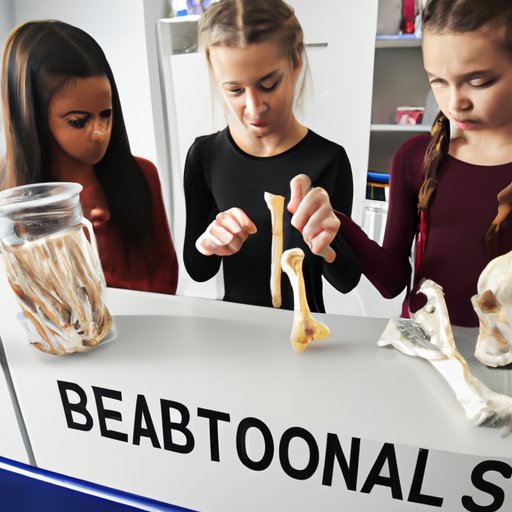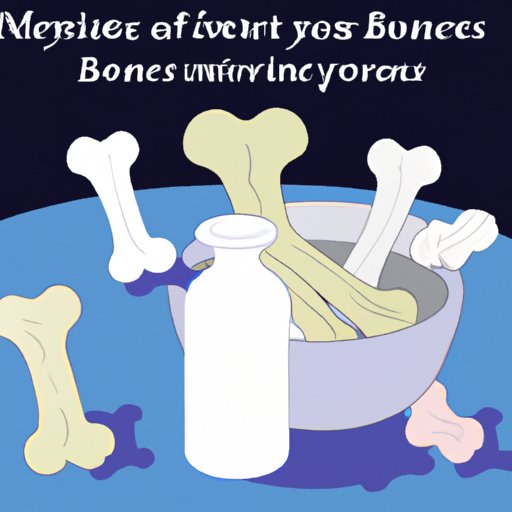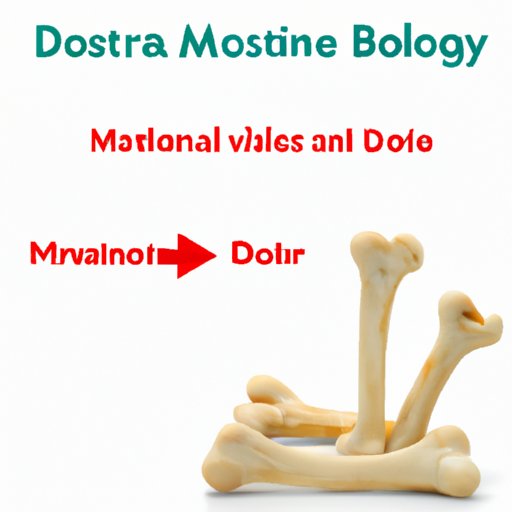Introduction
Bones are a vital part of the human body, providing structure, support, and protection for other organs and tissues. They also play an important role in the body’s ability to store minerals, which are essential for many bodily functions. In this article, we will explore the role of minerals in bone health and examine how and where bones store minerals.
Examining the Types of Minerals Found in Bones
The most common minerals found in bones are calcium, magnesium, phosphorus, potassium, iron, and zinc. Calcium is the most abundant mineral in the body, and it plays a crucial role in bone health by helping build and maintain strong bones. Magnesium helps regulate calcium levels and is also involved in muscle contraction and nerve function. Phosphorus helps with energy production and is necessary for the synthesis of proteins and nucleic acids. Potassium helps regulate blood pressure and fluid balance and is important for muscle and nerve function. Iron helps transport oxygen throughout the body and is necessary for the formation of red blood cells. Finally, zinc helps the body absorb nutrients and is essential for growth and development.

Exploring How and Where Bones Store Minerals
The structure of bones plays an important role in their ability to store minerals. Bones are composed of two main components: cortical bone and trabecular bone. Cortical bone, which makes up the outer shell of the bone, is dense and rigid. Trabecular bone, which is found within the cortical bone, is spongy and porous and contains a network of tiny channels that allow minerals to be absorbed and stored. The two types of bone work together to provide strength and flexibility.
Bones also contain several specialized sites where minerals can be stored. These include the endosteal surface, which is the innermost layer of the cortex, and the periosteal surface, which is the outermost layer. Both of these surfaces contain tiny pockets where minerals can be deposited. Additionally, the trabecular bone contains numerous cavities where minerals can accumulate.

Investigating the Benefits of Storing Minerals in Bones
Storing minerals in bones has several benefits for overall health and wellbeing. One of the most important benefits is improved bone strength. Minerals such as calcium and phosphorus help make bones stronger and more resilient. This can reduce the risk of fractures and other injuries caused by weak bones.
Discussing the Impact of Mineral Deficiencies on Bone Strength
Mineral deficiencies can have a significant impact on bone health. Calcium deficiency, for example, can lead to weakened bones and increased risk of fractures. Magnesium deficiency can also cause bone loss and increase the risk of osteoporosis. Other mineral deficiencies, such as those of iron and zinc, can also contribute to weakened bones.
Exploring Ways to Increase Mineral Storage in Bones
There are several ways to increase mineral storage in bones. Eating a balanced diet that includes plenty of nutrient-rich foods such as fruits, vegetables, nuts, and whole grains is one of the best ways to ensure adequate mineral intake. Taking dietary supplements, such as calcium or magnesium, can also help boost mineral levels. Additionally, regular exercise can help strengthen bones and improve mineral absorption.

Understanding the Relationship Between Diet and Bone Mineral Storage
It is important to understand the relationship between diet and bone mineral storage. Eating a diet rich in nutrient-dense foods can help ensure adequate mineral intake and promote optimal bone health. On the other hand, eating too many processed and refined foods can lead to mineral deficiencies and weaken bones. Therefore, it is important to focus on consuming nutrient-rich foods to ensure adequate mineral storage in bones.
Conclusion
In conclusion, bones play an important role in the body’s ability to store minerals, which are essential for proper functioning. Different minerals, including calcium, magnesium, phosphorus, potassium, iron, and zinc, are found in bones and help strengthen them. Bones also contain specialized sites where minerals can be stored. Increasing mineral storage in bones can have numerous benefits, including improved bone strength and reduced risk of fractures. Lastly, it is important to understand the relationship between diet and bone mineral storage, as consuming nutrient-rich foods can help ensure adequate mineral intake.
(Note: Is this article not meeting your expectations? Do you have knowledge or insights to share? Unlock new opportunities and expand your reach by joining our authors team. Click Registration to join us and share your expertise with our readers.)
